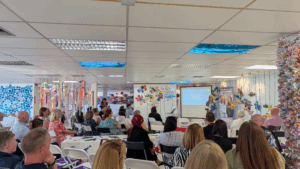
Glasgow’s planned review of a renowned mentoring programme could be doomed from the start unless the council reverses its decision to lay off in-school coordinators. This is according to leaders and former pupils who have benefited from the MCR Pathways mentoring programme in Glasgow.
Since it launched in 2007, MCR Pathways has helped thousands of care-experienced and other vulnerable pupils achieve higher rates of attendance, attainment and positive destinations. But the future of the programme has been called into question after Glasgow City Council voted in favour of a budget proposal that involved cutting support for the mentoring scheme.
The city’s pathways coordinators were called to a meeting last month and told that their specific roles would end in August. The council has framed the proposed savings as a review of MCR Pathways rather than an end to the programme, which it remains committed to continuing.
In a letter sent to coordinators following the February meeting, city officials said the review “has the potential of identifying a reduction to the current number and nature of roles required.” The letter adds: “It is our intention to undertake a review and explore all available options that will support the continuation of service provision and minimise wherever possible the impact on jobs.”
But MCR Pathways Founder and Chair Dr Iain MacRitchie said that the city council review might be working toward a foregone conclusion if the council doesn’t keep the pathway coordinators. He said: “Before volunteering, I had a career in corporate failure and working to transform it. The first rule is to learn fast from failure and don’t repeat it.” Budget documents show that the council has already pencilled in the savings from 24.6 full-time equivalent positions from MCR Pathways.
Trying to run the mentor programme without the coordinators, Dr MacRitchie said, would be repeating past failures. He added: “For two years of MCR’s early growth, we tried unsuccessfully to function outside the school gates without a dedicated coordinator.
“Schools are hives of activity and staffs time is precious. We knew we could not take up teacher time to help us organise, and we learned that relationships with each one of the most disadvantaged young people were a prerequisite to them engaging.
“That was then. Now teachers have even less time and more pressure. The need for connections is multiplying, as is the need for MCR Pathways coordinators and their talent and commitment. Removing them is not just madness, it would be devastating to those who need our help the most.” Within the MCR Pathways programme, the coordinators serve as a constant link between young people, their school and their mentors.
They begin working with pupils as early as primary school, supporting them in the transition to secondary and building a personal relationship which then helps young people get the most out of their time with their mentors. Coordinators even play a role in identifying children who aren’t already receiving social care, but who have conditions at home that put them in need of extra support. Although the mentors – professionals from a wide range of sectors who volunteer to support young people – attract the spotlight, it’s the mentors who lay the groundwork and keep the programme running. Although Dr MacRitchie worries about how a review can go ahead when staff already feel their jobs are at risk, he and supporters of the programme are still hoping for a reversal.
To this end, former pupils have taken it upon themselves to make the case for giving MCR Pathways a lifeline. Halah, a former mentee who is now a fourth-year business student at the University of the West of Scotland, said that if MCR Pathways is to survive in any form, the council has to bring back the coordinators. She added: “The programme would fall apart without the coordinators. They are the point of contact for most students in their schools.”
Susanne Richards, a law student at Strathclyde University, took part in MCR Pathways while she was in school. Six years later, her mentor, Jenny, is still providing support on everything from law school to having children. “We built a really good relationship to the point it did feel like a friendship,” Susanne said. “In my final year of high school there were weeks that I wouldn’t go to school. But I’d go in for that one hour just to see Jenny.”
Now, in addition to working on her law degree, Susanne works with young people as a participation worker. “I think I was really lucky getting involved in MCR and having all the support that I did. A lot of other care-experienced young people don’t have that. A council spokeswoman said: “Several options are being explored and no decision has been taken to stop the [MCR Pathways] programme. A crossparty, political oversight group has been established and we will keep staff and the relevant trade unions informed and
updated of developments.
“We understand that this will cause a degree of uncertainty but, with council savings of £108 million over the next three years it is significantly more challenging to protect education expenditure.”
When I left school in 2010, at the age of 17, I could not get out of there fast enough. Aside from all the inherent anxieties that come with being a teenager, my school years had been mainly uneventful, with decent results, good friends and mostly supportive teachers – but I was restless, impatient, and ready for something new and different.
I practically ran out of my last exam onto a London-bound train for a work experience placement, and never looked back. If you’d have told me then that less than a decade later I’d voluntarily spend hours each month back in a Glasgow high school, I would probably have said time travel was more likely. But one day in 2019, freshly self employed and looking to use my new-found flexibility to get more involved in my community, I found myself once again scraping back a chair on the speckled linoleum floor of a school canteen and taking a seat. That day marked my first as a volunteer with MCR Pathways, a school-based mentoring scheme that has supported thousands of disadvantaged young people across Scotland and parts of England since its inception in 2007. In Glasgow alone, MCR operates in every secondary school, engaging with around 2000 young people across the city.
The concept is simple: a young person is paired (through a matching system that takes into account both parties’ interests, career aspirations and backgrounds) with an adult volunteer who meets them for an hour every week in school.
The programme has been widely praised by experts and politicians alike, and a 2020 evaluation found it kept mentored pupils in school for longer, increased their chances of gaining qualifications, and led to more of them going on to further education or employment. But Glasgow City Council has announced its intention to stop funding the programme from August this year.
Like others across the city, I was dismayed and angered to read this news. While there are mountains of statistics pointing to MCR’s outsized impact and success, statistics can’t capture the moment that comes after weeks or months of meetings when a young person decides to trust you and seems to blossom in front of your eyes. They cannot account for a mentee raising their hand in class for the first time with a new-found confidence instilled by their mentor.
At times I’ve recognised in them the same restlessness and impatience that I felt as a teenager in school, but at others they’ve come to meet me bursting to share their pride at a test result or a piece of artwork. My first two mentees each left school to take up employment, passing on their contact details to stay in touch. My current mentee is a little younger; in our meetings, we often share an activity like colouring in or – on special occasions – snack together on cupcakes and hot chocolate. I ask her how maths has been and she asks me how wedding planning is going.
A lot of people in my life have expressed how difficult they’d find it to be a mentor, to go back into school and to talk one-to-one with a teenager for an hour every week. In a way they’re right building relationships takes time and conversations can be stilted and awkward at first, while a young person justifiably sizes you up and decides how they feel about you. And some of their life experiences are upsetting and difficult to talk about, though ample training and support is provided by MCR and its talented and committed staff before and during
every mentoring relationship.
These are the things we lose when we strip a society down to its barest bones: the connections, conversations and communities that wouldn’t exist otherwise, but which have a profound impact on those engaged in them. We might be able to keep a city running by funding the bare essentials and slashing away at everything else, but we will all be far poorer for it. For my own part, I hope to meet the person my mentee becomes: to find out what subjects she chooses next year, what career and life ambitions she goes on to develop, whether she gets to go on the European travel adventure I know that she dreams of.





